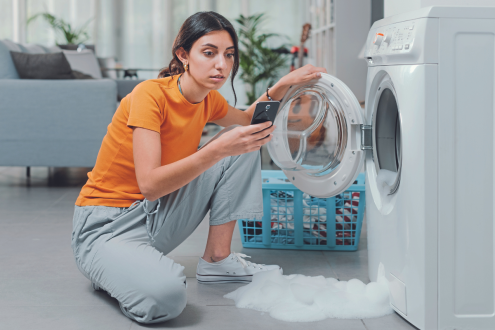Phones and mental health
The research is showing that there is a strong link between phone use and the rise in mental health issues

You would not believe how much of my coaching this year has been about mobile phones.
The Reality
I’m hearing that people:
- Aren’t sleeping because they are disturbed or distracted by devices which are by the side of their bed with notifications turned on all night.
- Are stressed because they can’t do the work they need to do because they ‘don’t have enough time’. But actually, when they total up the amount of time they spend on their phone, it adds up to many more hours than they need to do the work they have to do.
- Aren’t moving or exercising or getting fresh air because they are pinned to their bed or their chair with the phone which means they are not dissipating stress healthily.
- Are eating badly, or not at all, or too late, or too much because they are not mindful of their eating as they are consumed by their phone
- Are upset by messages which are so often misconstrued, misunderstood, ill considered, badly written, sent to the wrong person, sent at a bad time, sent without follow up, sent in high emotion.
- Are upset when they aren’t messaged, which makes them feel like people don’t like them and are leaving them out.
- Aren’t communicating with loved ones because their eyes and attention are glued to a screen
- Are feeling dissatisfied with their lives in comparison to the glossy Instagram and Facebook posts.
- Are feeling not good enough, like they don’t measure up to the people they follow and ‘like’
- Feel obliged to stay responding and connected even when they don’t want to for fear of upsetting others
- Are worried about missing out, not being invited, liked, included
- Feel like switching off would be rude, socially unacceptable, social suicide, unthinkable, impossible
- Think all this is normal and just how life is.
I’ve written before about my position as a parent regarding technology and it alarms me that parents seem to be so unaware of the risk that lurk in their children’s hands.
So here’s some research. See what you think. Pass on the information so people can make informed choices about behaviour and seek support to make a difference to their lives.
The Research
Mobile phone use and stress, sleep disturbances, and symptoms of depression among young adults – a prospective cohort study, Sara Thomée, Annika Härenstam and Mats Hagberg, BMC Public Health 2011 11:66
© Thomée et al; licensee BioMed Central Ltd. 2011, Received: 11 June 2010 Accepted: 31 January 2011Published: 31 January 2011
4156 20 -24 years old were studied to investigate:
‘Frequency of use, but also more qualitative variables: demands on availability, perceived stressfulness of accessibility, being awakened at night by the mobile phone, and personal overuse of the mobile phone. Mental health outcomes included current stress, sleep disorders, and symptoms of depression. ‘
They found that:
‘High mobile phone use was associated with sleep disturbances and symptoms of depression for the men and symptoms of depression for the women at 1-year follow-up’ and ‘High frequency of mobile phone use at baseline was a risk factor for mental health outcomes at 1-year follow-up among the young adults.’
This study got results which:
‘Indicate that psychological distress is related to maladaptive use of both the Internet and the mobile phone; females scored higher than males on the mobile phone questionnaire, showing more negative consequences of its maladaptive use.’
‘The objective of this study was to evaluate the possible psychological problems related to excessive cellular phone use in adolescents. Results from 595 participants showed that the potentially excessive user group had a tendency to identify themselves with their cellular phones and to have difficulties in controlling usage. They expressed more depressive symptoms, higher interpersonal anxiety, and lower self-esteem. A positive correlation was also observed between excessive cellular phone use and Internet addiction.’
Nomophobia: The Mobile Phone in Panic Disorder With Agoraphobia: Reducing Phobias or Worsening of Dependence? King, Anna Lucia S. MSc*; Valença, Alexandre M. MD, PhD†; Nardi, Antonio Egidio MD, PhD*Cognitive and Behavioral Neurology: March 2010 – Volume 23 – Issue 1 – p 52-54
‘Nomophobia is considered a disorder of the modern world and refers to discomfort or anxiety caused by being out of contact with a MP or computer. It is the pathologic fear of remaining out of touch with technology.’
Computers in Human Behavior, Volume 31, February 2014, Pages 343-350, Computers in Human Behavior
The relationship between cell phone use, academic performance, anxiety, and Satisfaction with Life in college students. Andrew Lepp, Jacob E. Barkley, Aryn C. Karpinski
‘We investigated the relationships between total cell phone use (Number = 496) and texting (Number = 490) on Satisfaction with Life (SWL) in a large sample of college students. It was hypothesized that the relationship would be mediated by Academic Performance (GPA) and anxiety. Two separate path models indicated that the cell phone use and texting models had good overall fit. Cell phone use/texting was negatively related to GPA and positively related to anxiety; in turn, GPA was positively related to SWL while anxiety was negatively related to SWL. These findings add to the debate about student cell phone use, and how increased use may negatively impact academic performance, mental health, and subjective well-being or happiness.’
CyberPsychology & BehaviorVol. 12, No. 5, Addictive Personality and Problematic Mobile Phone Use
Motoharu Takao, Susumu Takahashi, and Masayoshi Kitamura
‘Despite recognized safety concerns and legal regulations, some people do not refrain from using mobile phones. Such problematic mobile phone use can be considered to be an addiction-like behavior.’
Computers in Human Behavior, Volume 37, August 2014, Pages 290-297, Computers in Human Behavior
Out of sight is not out of mind: The impact of restricting wireless mobile device use on anxiety levels among low, moderate and high users, Nancy A. Cheever, Larry D .Rosen, L. Mark Carrier, Amber Chavez
‘We examined anxiety when wireless mobile devices were unexpectedly not available. Participants felt significantly more anxious over time. Heavy wireless mobile device users were more anxious than low or moderate users. Wireless mobile device dependency may cause anxiety when device is absent. Heavy wireless mobile device users may feel separation anxiety when device is absent.’
The Action
We have to do something. The mental health of the tech generation is in our hands and rapidly going downhill.
Information is a critical part of any behaviour change. So few people smoke now because we have been open and blunt about the risks. It’s time to be blunt about phone use.
Phones are not benign (and I haven’t even talked about cyber bullying, grooming, identity theft, links to criminal activity, data breaches, radicalisation, prejudice etc, etc). We need to limit our own use and be very, very firm with the young people in our lives.
If you wouldn’t let your kid smoke at home, or get drunk alone in their bedroom, if you worry about the dangers of drugs or abuse, this threat to mental well being is, I think a more pervasive and more immediate threat. Educating ourselves and our young people about the risks is crucial.
Behaviour change is essential. Our young people deserve healthier, more trouble free and happier lives than many of them currrently have.
If you want to find out more about how to relax, read about how silence or eco-therapy can help. Once you’ve clicked through, you can use the green box to download the first chapters of my book Love Being Me for free.
(Thank you Igor Ovsyannykov for the photo on http://fancycrave.com)
Julie Leoni
Coach, author, podcaster, facilitator, Yoga and psychology teacher, learner
I have over 30 years of experience and qualification in various therapeutic and meditation/mindfulness based approaches. I work with change. Some changes we chose, others happen to us. Sometimes we know we want to change but don't know how. Sometimes we don't want to change but external events or people are forcing us to change. The menopause, children leaving home, the end of a relationship or job, becoming a parent, coming out, bereavement are just some of the personal changes I support people with. I also work with people who want to make changes to their life and wider world in response to social issues such as Covid, the climate crisis and racial, sexual and gender inequalities. Times are changing whether we want them to or not and we need to be nimble, agile, curious and open in order to part of the new story emerging. Work with me to get clear on what matters to you, what makes your heart sing and what kind of future you want for yourself and those you love. It is possible to live differently, get in touch to explore how.



